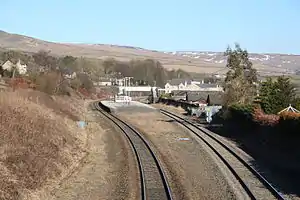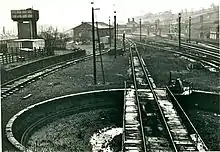Chinley railway station
Chinley railway station serves the village of Chinley in Derbyshire, England. The station is 17 1⁄2 miles (28.2 km) south east of Manchester Piccadilly, on the Hope Valley Line from Sheffield to Manchester. It is unstaffed and is managed by Northern Trains.
 Chinley Railway Station | |
| Location | Chinley, High Peak England |
| Grid reference | SK038826 |
| Managed by | Northern Trains |
| Platforms | 2 |
| Other information | |
| Station code | CLY |
| Classification | DfT category F2 |
| History | |
| Opened | 1867 |
| Key dates | |
| 1 July 1902 | Moved to current location |
| Passengers | |
| 2015/16 | |
| Interchange | |
| 2016/17 | |
| Interchange | |
| 2017/18 | |
| Interchange | |
| 2018/19 | |
| Interchange | |
| 2019/20 | |
| Interchange | |
| Notes | |
Passenger statistics from the Office of Rail and Road | |
History
The original station was built in 1867 by the Midland Railway on the extension of its Manchester, Buxton, Matlock and Midlands Junction Railway, which became its main line to London from Manchester. Originally, the Midland had planned to extend through Buxton, but the LNWR already had a line there. So, the Midland built a line through Chinley and Buxworth to join the Manchester, Sheffield and Lincolnshire Railway at New Mills; this was an association which became known as the Sheffield and Midland Railway Companies' Committee.
From Millers Dale, the line crossed the Black Brook valley at Chapel Milton. This became a double viaduct when the Dore and Chinley line was built in 1894, with a north curve forming a triangular junction just over a mile to the east. Congestion soon became a problem on the section west of Chinley and so the Midland quickly sought parliamentary approval to add additional capacity, with the enabling act passed in 1900 and the contract for a replacement station let shortly afterwards.
The new station was opened on 1 June 1902, when the line through Disley Tunnel to Heaton Mersey (and thence on to Manchester Central) was opened and the extra tracks between Chinley North Junction & New Mills South Junction were commissioned.[1] It also became the terminus of the Dore and Chinley line, instead of Buxton. The old station buildings were dismantled and re-erected on Maynestone Road as a private house. By 1904, Chinley had become an important junction between Manchester, London St Pancras and Sheffield, with five through platforms and one east-facing bay, with four main tracks passing through it.[2] Many express trains from the Midlands and London would call there to attach or detach coaches for destinations in the North West (including Blackburn and Liverpool Central High Level), as well as the main Midland terminus at Manchester Central. This practice became somewhat less prevalent after the 1923 Grouping when the London, Midland and Scottish Railway took over but, in the 1930s, some 40 eastbound and 38 westbound trains either called or started/terminated at the station each weekday.[1]

Decline
After World War II and the nationalisation of the railways in January 1948, passenger traffic from the station declined and the number of station calls with it, though four southbound London expresses and five from the capital still featured in the station's 1965 timetable. The 1963 Beeching Report recommended that the Peak District main line to Matlock and Derby be closed, as it duplicated the West Coast Main Line between Manchester Piccadilly and London Euston, which had recently been electrified. The Hope Valley route was also earmarked for closure in the report, but this was not implemented by the government due to the number of isolated communities it served along its route; the Woodhead line was closed to passenger services instead. The 1902 line through Heaton Mersey to Manchester Central and the link via Romiley to Stockport Tiviot Dale would also close; all trains henceforth ran to Piccadilly via New Mills and Marple instead.
With the closure of the line to the south in 1967/8, Chinley railway station lost its importance. Local passenger services to Buxton (Midland), Rowsley and Matlock were withdrawn from 6 March 1967;[1] the route closed to passengers the following year, along with the line to Manchester Central west of Cheadle Heath. The few surviving London trains via Sheffield ceased to call in 1972 and had disappeared altogether by 1979. Two of the four lines through the station were subsequently removed in 1981/2, as part of a track rationalisation and re-signalling scheme; the platforms they served were closed, along with the station signal box. The remaining two were then realigned to serve the middle 'island' platform and the remaining buildings were demolished.[1] The site of the southern island platform has been redeveloped and is now occupied by houses.[3][1]
Since then, it has served as a local commuter station on the Hope Valley route; the line itself still carries significant quantities of freight traffic, mainly limestone aggregates and cement, in addition to a frequent passenger service. Many goods trains that pass through still use part of the old route to Buxton to access the quarries at Peak Forest, whilst the line through Disley Tunnel was reopened to passenger trains in 1986, when a new chord was opened to link it to the Stockport to Buxton line at Hazel Grove. Since the summer 2017 timetable, all fast Sheffield to Manchester services use this route in order to call at Stockport, whilst the Marple route is used by the local stopping services that call here.[4]
Facilities
There is a waiting shelter on the platform, along with timetable information posters, CIS displays, ticket vending machine, bench seating and a customer help point. Train running details can also be obtained using the telephone at the station entrance. No level access is available, as the only route from the entrance to the platform is via the stepped footbridge.[5] Local rail users have been campaigning for the station to be made accessible for wheelchair users and parents with pushchairs since 2008, but the necessary funding under the 'Access for All' scheme has not yet been allocated.[6]
Services
The typical service is one train every hour to Sheffield and to Manchester Piccadilly. Additionally, a limited number of express trains between Sheffield and Manchester Piccadilly, operated by East Midlands Railway, stop at Chinley in the morning and early evening, giving the station through links to and from Liverpool Lime Street and Nottingham.
References
- "Chinley". Disused Stations. Retrieved 31 March 2016.
- Chinley station - 1903 National Railway Museum online photo archive; Retrieved 15 May 2017
- Chinley Station (2012) Hogg, Graham Geograph.org.uk; Retrieved 30 June 2017
- GB eNRT, December 2016-May 2017 Edition, Table 78
- "Chinley station facilities". National Rail Enquiries. Retrieved 22 February 2017.
- "Fighting to get improved access at Chinley station" Archived 22 December 2017 at the Wayback Machine Grosvenor, Lucy Buxton Advertiser news article 13 February 2016; Retrieved 30 June 2017
- Radford, Brian (1988). Midland Though The Peak: A Pictorial History of the Midland Railway Main Line Routes Between Derby and Manchester. Unicorn Books. ISBN 978-1-85241-001-8.
External links
| Wikimedia Commons has media related to Chinley railway station. |
- Train times and station information for Chinley railway station from National Rail
| Preceding station | Following station | |||
|---|---|---|---|---|
| Northern Trains | ||||
| Terminus | Limited service |
|||
| East Midlands Railway Liverpool-Norwich Limited service | ||||
| Disused railways | ||||
| Edale Line and station open |
Midland Railway | Buxworth Line open, station closed | ||
| Chapel-en-le-Frith Central Line and station closed |
||||